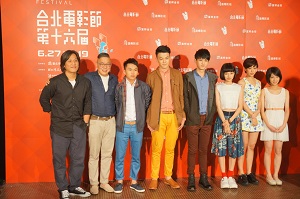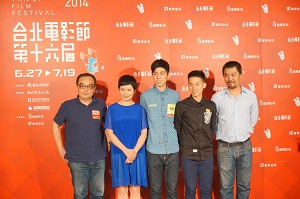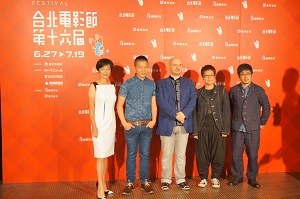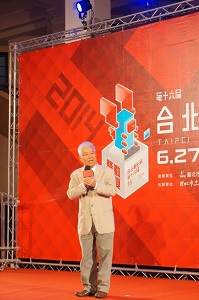Taipei Film Festival stirs anticipation as it opens in Taipei
By Hermia Lin The opening ceremony held on June 27 at the Zhong Shan Hall was graced by the presence of budding Taiwanese directors and actors/actresses. The most highly-anticipated Taiwanese productions including Partners in Crime, Meeting Dr. Sun, Design Love, Exit, and Ice Poison have been selected by the TFF and would meet Taiwanese audiences for the first time before their release in Taiwan. Focus on Taiwan The opening feature, a high school-set suspense thriller, a genre rarely explored in Taiwan, is directed by Taiwanese director Chang Jung-chi. Chang rose to fame with his debut feature Touch of the Light. The film portrays the relationship between a blind pianist and an aspiring dancer. After its release in Taiwan in September 2012, the film garnered many prizes across Asia putting the 34-year-old director in the limelight for a long time. His second feature Partners in Crime has been the talk of the town in Taiwan and good reviews started to roll in after its world premiere at the TFF. The cast of Partners in Crime includes Wu Chien-ho and Wen Chen-ling, who have starred in Hsu Chao-jen's acclaimed debut feature Together, and new actors Yao Ai, Teng Yu-kai, Cheng Kai-yuan and Hung Yu-ching. Chang Jung-chi said he wants to "explore and discover the benign part out of the dark side of human nature” through the film. Meeting Dr. Sun tells the story of Lefty, who sees himself as the poorest high school student in Taipei and plans to steal an abandoned statue of Sun Yat-sen to sell it for cash. Lefty meets another group of students who happen to have the same goal as his gang, and the two groups start a fight of wits. Burmese-Taiwanese Helmer Midi Z's Ice Poison will also debut at the TFF. Ice Poison, which uses a documentary-like approach to portray the tale of two young Burmese people trying to escape from grim economic realities, is said to be Midi's strongest film to date. It made its world debut at this year's Berlin International Film Festival receiving rave review. It has been touring extensively since its Berlin debut showing at 12 international film festivals, including Tribeca Film Festival, Moscow International Film Festival, Edinburgh International Film Festival, Southeast Asian Film Festival, Luxembourg City Film festival, Osaka Asian Film Festival, to name just a few. On June 27, Midi Z bagged home the biggest prize—the Best Feature in the International Competition section at the Edinburgh International Film Festival. The award not only marked the first win for Midi Z at an international film festival, but also the first time for any Taiwanese-produced films to grab an award at the Edinburgh International Film Festival. On June 30, the Ministry of Culture gave a NT$100,000 cash prize to Midi Z and his film crew, who are all Taiwanese, for winning the award. The 32-year-old director said he is thankful for the recognition, adding "he could not imagine what he would be doing now had he not come to Taiwan.” Midi Z moved to Taiwan from Myanmar when he was 16 years old. He said the openness of the society of Taiwan has allowed him to make films freely, and the works made by auteur Hou Hsiao-hsien and Ang Lee have major influence on his films. New Talent Awards Besides the highly-anticipated Taiwanese features, the films selected at the International New Talent section are expected to attract large audiences as well. The TFF celebrates the 10th anniversary of the launch of the International New Talent section. The section has been known for introducing the works of rising directors from around the world. Each year, the TFF gives away awards and prizes for Best Feature, Special Jury Prize and Audience Choice Award for outstanding works. In addition to discovering new talents, this year, programmers of the TFF looked back on the winners and nominees of the past decade, tracing their footsteps of cinematic creation, and selected the best ones for screening. "Thank you. I am a little shocked. I didn't expect to win," he said in an acceptance speech at the ceremony. "Taipei Film Festival will be the most memorable festival for me from now on and Taipei will always have a special place in my heart,” he added. The Special Jury Prize was awarded to two films this year—Dutch director Jim Taihuttu's black-and-white gangster drama Wolf and Hungarian director Adam Csaszi's Land of Storms. Israeli director Yuval Adler grabbed the Audience Choice Award with Bethlehem, which tells the dilemma of a Palestinian boy who has to choose between his family and an Israeli secret service officer whom he has secretly developed a close bond with. Bethlehem took away the Best Feature at the Venice Days of the Venice Film Festival in 2013. The TFF presents more than 150 movies with a focus on Polish Cinema this year. It features old classics from Polish auteurs, including Andrzej Wajda's Ashes and Diamonds, Krzysztof Zanussi's A Year of the Quiet Sun and Krzysztof Kieslowski's semi-autographical feature, Camera Buff, as well as modern works made in the past five years in Poland. The program director of the TFF Kuo Ming-jung said she spent much time doing research in Warsaw and had as many conversations as possible with film professionals from the Polish film industry, as she wishes to understand the development of Polish Cinema in the past 5 years and shares her observation with the local audiences. According to Kuo, there is a resurgence of interest in the national identity of the Polish people, and many directors choose to explore the topic in their films. The TFF runs until July 19. An award ceremony will be held that day at the Zhong Shan Hall, during which 40 Taiwanese films will vie for the Grand Prize of the NT$1 million for Best Film, and other important awards. Last year the Best Film trophy was given to Shen Ko-shang's thought-provoking documentary A Rolling Stone.
Staff Writer The Taipei Film Festival (TFF), which began June 27, has drawn thousands of film enthusiasts from around Taiwan to view some of the best features from home and abroad.
The Taipei Film Festival (TFF), which began June 27, has drawn thousands of film enthusiasts from around Taiwan to view some of the best features from home and abroad.
Filmmaker Silvia Chang, chairwoman of the TFF, told reporters at the opening that Taiwanese films sold very well this year. According to Chang, some of the screenings of the local features were selling much faster than foreign features. The tickets to the opening film Partners in Crime, for example, sold out in a flash. Another highlighted local production making a splash at the TFF is Meeting Dr. Sun, director Yi Chih-yen's latest feature film following the popular and influential Blue Gate Crossing. Heart-throb Berlin Chen and actress Kwei Lun-mei had their big screen debut in the film. Blue Gate Crossing was selected in the Directors' Fortnight of the Cannes Film Festival in 2002, and was nominated for Best Asian Film at the Hong Kong Film Awards in 2004.
Another highlighted local production making a splash at the TFF is Meeting Dr. Sun, director Yi Chih-yen's latest feature film following the popular and influential Blue Gate Crossing. Heart-throb Berlin Chen and actress Kwei Lun-mei had their big screen debut in the film. Blue Gate Crossing was selected in the Directors' Fortnight of the Cannes Film Festival in 2002, and was nominated for Best Asian Film at the Hong Kong Film Awards in 2004. At an award ceremony held on July 2, South Korean director Lee Yong-seung walked away with the Grand Prize—the Best Feature with his debut film—10 Minutes, a black drama that loyally portrays the ordeal of mundane office life with colleagues plotting evil against each other.
At an award ceremony held on July 2, South Korean director Lee Yong-seung walked away with the Grand Prize—the Best Feature with his debut film—10 Minutes, a black drama that loyally portrays the ordeal of mundane office life with colleagues plotting evil against each other. Polish Cinema
Polish Cinema To have a deeper understanding of the contemporary look of Polish Cinema, the TFF will also host lectures, panel discussions and workshops by film professionals including Midi Z and Polish festival director Michal Chacinski.
To have a deeper understanding of the contemporary look of Polish Cinema, the TFF will also host lectures, panel discussions and workshops by film professionals including Midi Z and Polish festival director Michal Chacinski.

![Taiwan.gov.tw [ open a new window]](/images/egov.png)
